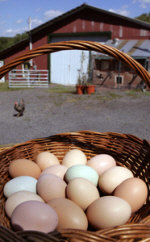



Why the Fee-Range Egg Might Come First
CZECH - The embryonic state of the socially responsible and organic trading sectors where big Czech retailers are concerned is perhaps well demonstrated by the huge difficulty a supermarket customer will typically face even when searching for a free-range egg.
Such eggs—different from factory farmed eggs in that they come from birds that are allowed to roam during the day rather than being permanently caged—have, for instance, been a basic item in U.K. supermarkets for at least 20 years, but are yet to make much impact on the consciousness of the Czech consumer.
That could all change, however, in the not too distant future. The European Union is banning “barren” battery cages from 2012. Only “enriched” cages, which must meet certain requirements such as 600 square centimeters of useable cage area per hen and the inclusion of a perch, will be permitted.
According to Anna Fraser, food policy research officer for U.K.-based farm animal welfare organization Compassion in World Farming (CIWF), several British supermarkets have or have pledged to ban factory farmed eggs ahead of 2012, while barren battery cages are already banned in Sweden and will be banned in Germany from 2008 and Austria from 2009.
In Holland, it was in 2003 that major Dutch supermarkets came to an agreement with animal welfare organizations to stop stocking eggs that came from hens confined in cages.









